Kelly Mann: Legacy Maker – 2021 Inductee Spotlight
April 19, 2022By Jason Beck
How’s this for serendipity?
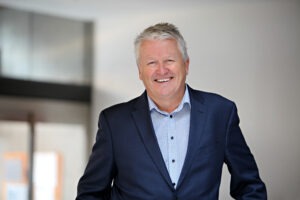 It’s 1974. Kelly Mann is 16 years old finishing his Grade 10 year at Lansdowne Junior High School in Victoria. He plays intramural sports, serves as manager of the boys volleyball team, and goes on to receive the school’s Service Award at the end of the year. In Kelly’s yearbook a young practicum teacher named Roger Skillings writes the following message:
It’s 1974. Kelly Mann is 16 years old finishing his Grade 10 year at Lansdowne Junior High School in Victoria. He plays intramural sports, serves as manager of the boys volleyball team, and goes on to receive the school’s Service Award at the end of the year. In Kelly’s yearbook a young practicum teacher named Roger Skillings writes the following message:
“Sport or politics? All the best, Roger Skillings.”
Fast forward nearly twenty years and Kelly is applying for an event manager position. Who hires him? That same practicum teacher, Roger Skillings, but now the CEO of the BC Games Society, who then goes on to mentor Kelly for the next several years. Then when Roger moves on in 1999, Kelly is hired as his successor and will serve as the BC Games Society CEO for the next 19 years.
And the answer to that looming yearbook question posed by Roger to Kelly all those years ago? Well, ultimately to Kelly it was not one or the other between sport or politics, but both.
“I’m in this mix of sport as a multi-sport Games senior person and I’m in the milieu of municipal governments and dealing with ministers,” Kelly explained in a recent phone interview. “How prophetic of him to say that. I remind him of that constantly. We still get together regularly. He saw something in me that I certainly didn’t see in myself that he wanted to encourage and coax.”
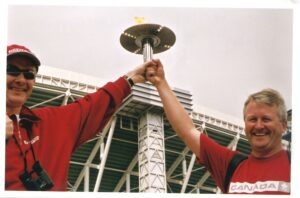 What he saw was an individual with the enthusiasm, integrity, and knowledge who for over 25 years would go on to be the driving force behind the elevation of the BC Games Society into perhaps the most pivotal multi-sport athlete development event in the BC sport system and a model for provinces across Canada.
What he saw was an individual with the enthusiasm, integrity, and knowledge who for over 25 years would go on to be the driving force behind the elevation of the BC Games Society into perhaps the most pivotal multi-sport athlete development event in the BC sport system and a model for provinces across Canada.
Maybe Marion Lay, a BC Sports Hall of Fame Honoured Member inducted in 2005, and also a BC Games board member who was part of the interview process when Kelly was hired as CEO said it best: “His contributions and legacies will be remembered and celebrated for decades in sport in BC.”
Born in Ladysmith, Kelly’s family moved to Victoria when he was barely two years old when his father retired from his job at BC Hydro. Kelly still lives just ten blocks from where he grew up in Victoria and considers the capital city his hometown. He was the youngest child of five in the Mann family, ten years younger than his older brother Alan who was second youngest. All of Kelly’s other siblings had already moved out of the house by the time he was even born.
“I was more or less raised an only child,” he said.
Sport was always part of life in the Mann family. Older brother Alan played on Victoria High School’s BC boys provincial high school championship team in 1966. When asked what his earliest memory in sport is, Kelly recalled playing Little League baseball at the little park on the corner of Hillside Avenue and Cook Street in Victoria.
“That’s where I started to play ball when I was eight years old for a team called the Gyros,” said Kelly. “Mr. Robinson and Mr. Allen were my coaches.”
Baseball remained his favourite sport throughout his youth as he played right through his teens and then fastball in his late teens/early twenties and later slo-pitch for various Victoria-area teams. He played mostly second base, but also a little at catcher and in the outfield. “But I could not bat my hat size,” he chuckled. “All glove and no stick, I would say.”
Interestingly, considering he would devote much of his adult life to building youth sport, Kelly’s earliest baseball heroes were not pro stars in the big leagues but local players his own age. One was Glen Wallis, who could “hit the ball over Hillside Avenue as a twelve-year-old into what was then the orphanage” and others were the Crowe brothers who could “throw the ball so fast it was looking like an aspirin pill by the time it crossed the plate.”
Kelly also ran track and played intramural sports in high school at Lansdowne and later Oak Bay High School.
“I was good at sport, but never good enough to play on the school teams,” he remembered. “So I became the manager for teams, like the boys volleyball team that Wayne Van VanOsterhout was coaching in Grade 10.”
A key moment was the awarding of the aforementioned Service Award at Lansdowne, the second highest award the school handed out and an early sign of the direction Kelly would follow.
“It was an honour that was maybe starting to spell some things out for me as far as my future path,” he noted.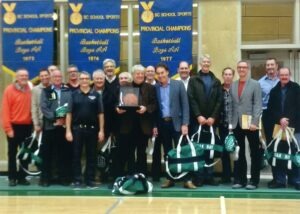
He continued managing teams at Oak Bay in his Grade 11 and 12 years, but in basketball which was huge then under coach Don Horwood, as it remains there today.
“I just knocked on his door one day and said, ‘I want to be your manager.’”
After graduating Kelly worked several jobs before realizing he wanted to become involved again with sport. A position came up at the BC Games Society and he applied, but he had no experience so was never really in the running. Later another position opened up at BC Games and he again applied.
“Second time I had left BC Hydro and was employed with the Lions Society of BC working with volunteers and doing events, which is basically what the Games are,” he said. “So I got the interview with Roger Skillings and a few others and that was when coincidentally Alison Noble [current BC Games CEO today] was hired. Roger said, ‘Get more experience and then come back.’”
Almost two years to the day an event manager position became available at BC Games and persistently on the third try Kelly finally got the job and came on staff with the Society in 1992. He served in the event manager role for over six years working closely with other key BC Games staffers Joe Stephenson, Kim Browning, and Alison Noble early on. They each had specific responsibilities and areas to fulfill working with volunteer teams from each host city for each BC Games. At that time the Society organized BC Winter and Summer Games annually within the same calendar year. It was a frenetic pace with a myriad of tasks and details to attend to within the unique circumstances and environment of each new host city around BC. But Kelly fell in love with it all.
“Chug chug chug, just going forward, going forward and not having a chance to look up from your desk really.”
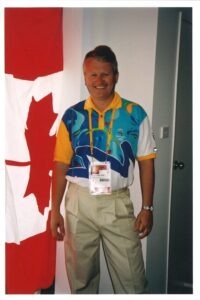 As event manager, Kelly was responsible for accommodation, medical, food services, and communications at each Games.
As event manager, Kelly was responsible for accommodation, medical, food services, and communications at each Games.
“Looking after the logistics of putting all those pieces together so that we could have a Games,” he explained. “That was making sure the kids were in their right rooms in all the schools. That was making sure they got fed the three squares [meals] a day. Medical was making sure a clinic was set up. Communications was all the phone systems and walkie talkies and that sort of thing.”
It was a lot to juggle, but there was always support from volunteers in each host city.
“I would work with all of these key volunteers and that was one of the things that I missed when I became the CEO. My knowledge of the community [hosting the Games] was much, much less because I wasn’t there as often and I wasn’t working with the real movers and shakers, the chairs of each area of responsibility. I would have communication with the board of directors and senior volunteers in planning, but not the folks that really made the train move for each Games.”
It was a fantastic way to learn from the ground up the inner workings of not only the BC Games, but the many various sports at the grassroots level across BC, the sport system with the province, and how it all intertwined. CEO Skillings took a liking to Kelly and helped bring him along.
“I remember over time, not realizing it at the time, but he was kind of grooming me a little bit to take his place,” said Kelly.
It meant that when Roger planned to move on from the BC Games Society’s CEO position in 1999, there were few individuals better equipped to take on this role than Kelly. He just may have been one of the last to realize how well suited he was to lead the BC Games at that time. People were asking him if he planned to apply for the CEO position. “’I’m not qualified to do this job,’ I said.”
Thankfully Patti Hunter, who was managing the nomination process for the CEO position, encouraged Kelly to apply.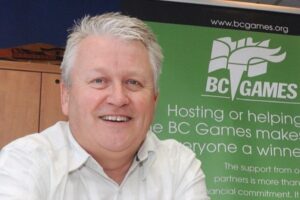
“I did so I won’t say begrudgingly,” recalled Kelly. “But knowing I didn’t have [university degree] letters after my name was really something that stuck with me because I wasn’t as ‘smart’ as these other people in my view. And that’s still something that sticks in my head from time to time.”
The interview process was intimidating to say the least with each applicant facing a panel of board members including venerable sport leaders Marion Lay and John Furlong, another future BC Sports Hall of Fame inductee in 2004. Kelly remembered being pretty nervous going in but impressed the panel. Marion in particular remembered Kelly’s interview:
“When Kelly applied to the president and CEO of the BC Games, I was surprised because his experience was more operational than as a leader. However, he had a terrific inspirational interview and I will always remember how he talked about his two passions in sport. One was to allow every child in BC to have the opportunity to be involved in sport and allow them to attain their personal level of excellence and the second passion was to ensure that communities in BC had an opportunity to experience firsthand the positive impact that sport can have through the BC Games on their community.”
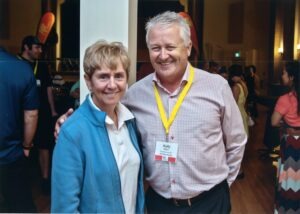 Based on what he had learned and experienced over the previous six years staging Games all over BC, Kelly had succinctly spelled out the guiding principles the BC Games would follow over the ensuing two decades.
Based on what he had learned and experienced over the previous six years staging Games all over BC, Kelly had succinctly spelled out the guiding principles the BC Games would follow over the ensuing two decades.
“Based on that, I guess the letters after my name became moot,” he said. “Anybody can do any job, it’s who you are as an individual. You can have all the letters beside your name you want but if you’re a jackass, why would I want to work with you? But if you’re a good person and you do the right things for the right reasons, then the letters aren’t necessarily as important as who you are as an individual. They say, ‘Hire for personality and train for skill’ something along those lines, to quote somebody else that’s smarter than me.”
When all was said and done, Kelly was hired as the new BC Games president and CEO, his first official day April Fool’s Day 1999.
“Yeah, how about that?!” he laughed. “And then my last day [in 2018] was Halloween!”
There’s probably a bad pun or analogy in there somewhere, but what Kelly accomplished between those two days separated by 19 years was no joke.
To begin with, the BC Games is quietly one of the largest annual multi-sport events that takes place in Canada. During Kelly’s term as CEO overseeing the Games, the organization impacted over 250,000 athletes, coaches, and officials, as well as tens of thousands of volunteers in over 90 BC communities. Each community recruits over 80 committee chairs to organize the Games and around 3500 volunteers to pull it all off. Those are impressive numbers but to really illustrate how large the BC Games truly is, Kelly effortlessly slides back into his former CEO role with some remarkable examples.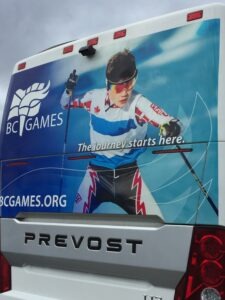
“When a transportation system for the BC Games is running in a community getting participants to and from venues, it becomes the third largest transportation system in all of BC,” he said, pausing for emphasis to let that startling fact sink in. “And the Games staff are doing it off the side of their desk with a bunch of people who have day jobs who have families who have hobbies and a life and the buses run.”
Here’s another.
“If you made a sandwich for your child every day from the day they started kindergarten to the day they graduated high school that’s how many sandwiches get made to feed the kids at one BC Games.”
Four years after his retirement from the head position with BC Games and Kelly can still recite startling soundbites like this at will.
“Think back to your days playing youth sports and being part of an eight-team tournament,” he said offering another. “Now multiply that by twenty sports and throw in a medical system and awards and scholarships. I just don’t think people understand the perspective and scope of the BC Games.”
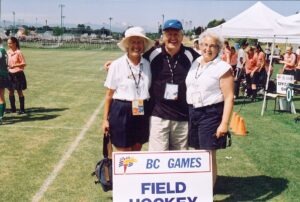 Coming from his role as event manager and seeing the nuts and bolts of each Games functioning—or not—up close gave him unique ground floor knowledge of the Games ‘in the trenches’ that most CEOs never acquire. It also made for a difficult transition for him personally at times in the CEO position which requires a 35,000-foot view of the entire forest instead of each individual tree.
Coming from his role as event manager and seeing the nuts and bolts of each Games functioning—or not—up close gave him unique ground floor knowledge of the Games ‘in the trenches’ that most CEOs never acquire. It also made for a difficult transition for him personally at times in the CEO position which requires a 35,000-foot view of the entire forest instead of each individual tree.
“It took me a long time to realize that the little things really don’t matter,” he explained. “If you pull back the curtain and say I walk with you through the BC Sports Hall of Fame, I would be looking around saying, ‘This is wonderful!’ while you would see some little error and say, ‘Shoot, I can’t believe we’ve done that.’ I likened it to the swan going across the lake. You go to a BC Games and you see the swan gliding wonderfully across the lake. Whereas I see those two big ugly black feet paddling like hell to make the swan move, you know? We see the same thing but just from a different perspective.”
Working with communities preparing the millions of complex details that go into a single BC Games and overcoming unforeseen difficulties could be incredibly challenging and stressful, but the end result when the Games opened was always worth it.
“There’s never a prouder moment than when the kids come into the Opening Ceremony, it’s just a great feeling,” he said, his voice rising in excitement over the phone, his passion for the Games still evident. “You turn around and the board members are so proud of themselves because they’ve busted their butts for two years to make this thing happen. Their motivation is purely the joy of seeing their community thrive. They’re not getting a pay cheque. That smile on the kids’ faces that’s what they’re after. You talk to them after and you say, ‘How was that?’ and they go, ‘I wouldn’t do it tomorrow, but I would do it again.’ I remember going to Port Alberni once leading up to a Games and asking a group, ‘Now who’s done this before?’ and half the room put their hand up. To me, that’s a measure of the success of the organization.”
In his role he actively worked to ensure the BC Games were as inclusive as possible partnering with various groups like ProMOTION Plus and ISPARC. He also often found himself working closely with various levels of government from municipal to provincial and even federal.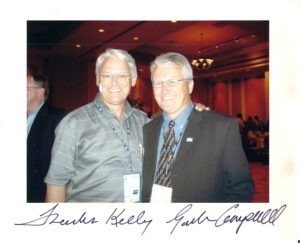
“I always tried to be ahead of the curve when it came to government,” he said. “I would listen to the BC throne speech and try to figure out how we could fit in with what the government was trying to focus on. I remember the best one was the government wanted to cut down on carbon emissions. So we already housed basketball players in the house across the street from the gym at the Games. Go figure, it just makes sense. But then when we had to do it because it was ‘green’ [environmental policies], well we were doing this because we don’t have to bus them everywhere. The kids could just walk to the gym. The government said, ‘Geez, you guys are geniuses!’ No, it’s common sense.”
One of Kelly’s proudest accomplishments during his time with BC Games was moving the Games from a participation or recreational model to a developmental model which emphasizes the development and growth of young athletes, coaches, and community sport in general. The BC Games became a national leader in this regard during Kelly’s term and it’s no coincidence that BC consistently punches above its weight with more athletes on participating on Canadian Pan Am, Commonwealth, and Olympic teams, on national teams, and in professional sport than any other province in Canada per capita. There are also more people in BC participating in sport in various roles and capacities for life as well.
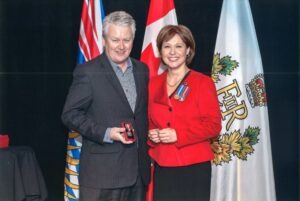 “To say that it was started by me would be very misleading,” Kelly cautioned. “It was started by Kim Browning, who went to the various sports and started the conversation. It just needed some tweaking, and it wasn’t truly embraced by the PSOs at the outset. With conversation and with great input from my staff—Irene Schell and Chris Trenholme—we felt we could get them on side.”
“To say that it was started by me would be very misleading,” Kelly cautioned. “It was started by Kim Browning, who went to the various sports and started the conversation. It just needed some tweaking, and it wasn’t truly embraced by the PSOs at the outset. With conversation and with great input from my staff—Irene Schell and Chris Trenholme—we felt we could get them on side.”
To illustrate the change, Kelly recalled early on once at a BC Games in Penticton, these four older women had been flown in from Prince Rupert to compete in golf. They were so happy the Province of BC had paid to fly them in to play on these beautiful golf courses. They would golf, drink wine all afternoon, and stay in a hotel and then go home again.
“They had a girls weekend, which is fine. But that’s hardly youth sport development. So we moved from that and we did it over time. It became a model not only for the rest of the country because other provinces moved in that direction based on our experiences and successes, but also when you think back to long-term athlete development, the Games became an integral planning tool. So we became a reason for government to fund us. They were no longer funding a bunch of old guys going and playing basketball on the government dime in Kitimat. Why can’t it be 15 or 16-year-old kids competing in whatever sport?”
Later they would track how many athletes went through the BC Games and ended up at the Canada Games or on Canadian national teams or competed for Canada internationally at the Olympics. The success stories of BC athletes who came through the BC Games on their rise up to winning Olympic medals or world championships or playing their chosen sport professionally would serve as inspirations for the next generation and the cycle continues rolling along. And there are many, many examples: from Josh Dueck, Brent Hayden, and Carey Price to Carol Huynh, Maelle Ricker, and Karina LeBlanc among others. Put simply, the BC Games has evolved into the province’s fundamental first step for many athletes on their sport journey, whether that’s to the top of the podium at the pinnacle of their chosen sport or living a healthy, active lifestyle and giving back to sport in some way for life.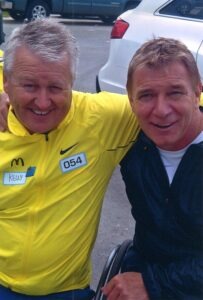
“I think the BC Games gives young people something to aspire to,” Kelly said. “If I want to be a baseball player or a soccer player, there’s got to be more than just going to my local park and playing against the same kid that I played against in high school. Same stuff, different day. But the BC Games can be somebody’s Olympics. I was never good enough to play on a national or even provincial level team, but I may have been good enough to play on a Zone team. But if I as 12-year-old kid march into an Opening Ceremony, knowing that even as a jaded old man I get goosebumps, I can only imagine what I would get if I was that 12-year-old kid. That might be that kid’s Olympics. They might never go to anything beyond that. I hope they do, but they might not. But if they’ve had a positive experience that the BC Games has somehow influenced and they stay in sport whether as a lifetime athlete or they take up refereeing or they become an administrator of a coach, then I think we’ve done our job. If I were to put one word to my time as BC Games CEO, it would be this legacy.”
Beyond the BC Games, Kelly also contributed to a variety of other sport organizations. He served as a founding chair of KidSport Victoria, as a Vancouver 2010 Olympic and Paralympic Winter Games ambassador, and as a board member or advisory committee member for the Victoria Harbour Cats Baseball Club, Pacific Institute for Sport Excellence, the Aboriginal Sport and Recreation Council, and the Multi-Sport Organization Leadership Council. He also worked closely with the Canada Games when Prince George hosted the Canada Winter Games in 2015. It marked the first time that the BC and Canada Games had worked closely together and it allowed both organizations to develop through transfer of knowledge.
“It further cemented that pathway that kids, participants, and volunteers go through,” Kelly emphasized.
Somehow through it all Kelly found time for family, married to his wife Kim for 30 years and raising two kids, Spencer and Lindsay, now in their twenties.
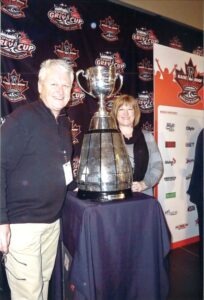 “We all get somewhere because of others. There are a laundry list and a phone book of people I should be thanking for helping and supporting me and it starts with them.”
“We all get somewhere because of others. There are a laundry list and a phone book of people I should be thanking for helping and supporting me and it starts with them.”
When you work with as many communities and groups and sports, you inevitably cross paths with a lot of people over 25 years as Kelly has. Here’s a sampling of a few testimonials from individuals paying tribute to Kelly during his career:
“He is a tireless champion of sport, communities, and people, and is a proud British Columbian. His impact on so many levels is incredible.” – Christopher Trenholme, Badminton World Federation
“Kelly is a true sport advocate. He has given much of his adult life to encourage and support young athletes, those who attend the BC Winter and BC Summer Games and those reached through his community work. Kelly constantly left an impression on the host communities and volunteers—representing so well the values of true sportsmanship and the values of the BC Games Society.” – Jamey Paterson, BC Games Society chair & Irene Schell, BC Games Society event and technology manager
“The BC Games Society under Kelly’s leadership has become a force of social development through sport. He has empowered communities across BC for positive social change.” – Gordie Hogg, former Member of Parliament, South Surrey – White Rock
“I was fortunate to play a small role as a volunteer at the 2014 BC Summer Games and this enabled me to see yet another side to how powerful Kelly’s influence has been in bringing a community together and facilitating, with his amazing team, an event of enormous size, scope, and complexity. The fact they can pull this off, cycle after cycle and in a different environment every time is testament to the leadership of Kelly.” – Rick Benson, former Softball BC executive director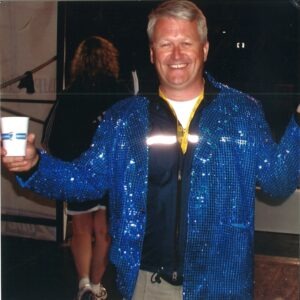
“Kelly’s passion for sport is infectious and his sense of humour makes any interaction with him memorable. His accomplishments should be recognized well beyond the realm of sport because his ability to bring an entire community together transcends the playing fields, rinks, and pools. His belief in the tremendous value that sport brings to individuals and communities and his talent in guiding and directing volunteers, has led to the BC Games being recognized as the ‘gold standard’ for provincial/territorial multi-sport games in this country.” – Pete Quevillon, KidSport BC director
“Kelly’s commitment to building positive sport experiences for BC athletes, coaches, and volunteers in partnership with communities should earn Kelly a GOLD MEDAL as he truly makes everyone feel included in this sport journey.” – Carolynn Boomer, PacificSport Interior BC executive director
“I have always tried to schedule my meetings with Kelly in Vancouver. The reason is that every time I met Kelly in Victoria we would be constantly interrupted by well wishers thanking Kelly for volunteering his support of a community charity of a kid’s event in Victoria. I once asked Kelly if he actually knew everybody in Victoria and he responded ‘that he didn’t know everyone yet, but in time hoped he would.’ Kelly has been a friend and colleague and someone that I could always trust when I needed a ‘reality check’ or a ‘sober second opinion.’” – Marion Lay, BCSHOF Honoured Member
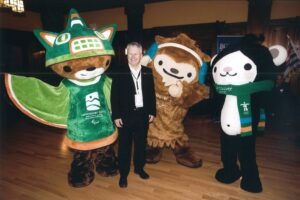 “As a result of Kelly’s leadership, we have a provincial family of over 100,000 leaders, volunteers, athletes, coaches, officials, media, and parents who are forever connected through the BC Games movement.” – Moira Gookstetter, BC Games director
“As a result of Kelly’s leadership, we have a provincial family of over 100,000 leaders, volunteers, athletes, coaches, officials, media, and parents who are forever connected through the BC Games movement.” – Moira Gookstetter, BC Games director
“From convincing his Board of Directors at BC Games to voluntarily house and provide administrative support in the early days of the formation of the KidSport Victoria chapter through to nominating others for recognition of their contributions, Kelly commands respect from all in the sport community. There are countless thank-you notes from low-income parents who received KidSport grants to register their child in a season of sport.” – Patti Hunter, KidSport Greater Victoria general manager
Let’s give the final word to Kelly himself on his induction into the BC Sports Hall of Fame.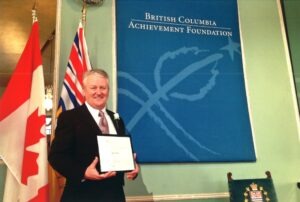
“When I got the call, I got all goosebumpy and I really got quite emotional because you do your work because that’s what you’re getting hired to do. But I guess if you’re doing your job and people are recognizing that in a way that provides for you an honour, then that is so terrific. I get like my father, really emotional. Even now, just talking about it, you can probably hear the catch in my voice. But it’s very humbling. It’s pretty rarified air and to be part of that is unreal.”
As part of the Class of 2021, Kelly Mann will be formally inducted into the BC Sports Hall of Fame in the Builder category at the annual Induction Gala to be held June 9, 2022 at the Vancouver Convention Centre.